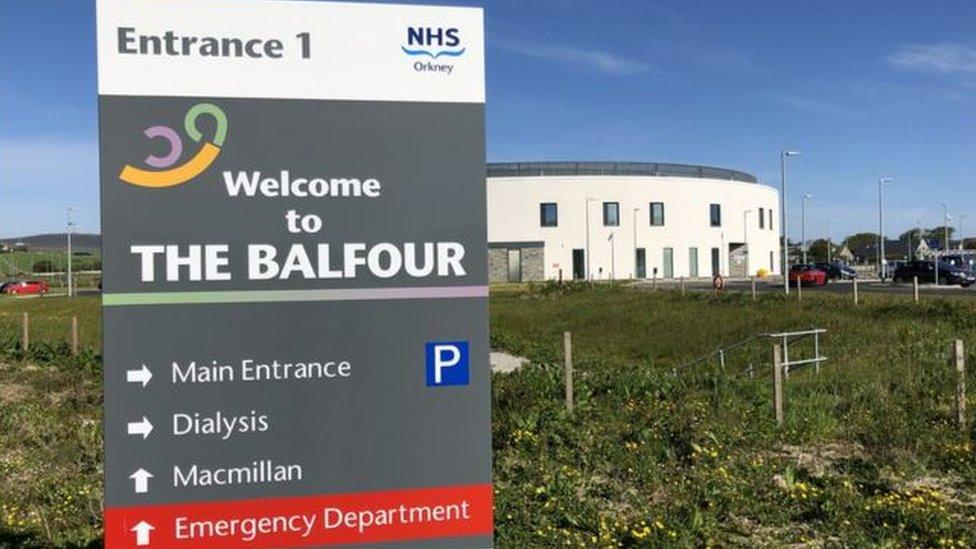Scotland's first net-zero hospital leads the way
- Published

Orkney's £65m Balfour hospital was opened in 2019
The distinctive curvature of Orkney's £65m Balfour hospital is most apparent from above.
Its design references Skara Brae, Orkney's famously well-preserved Neolithic settlement, but it also offers protection from harsh weather on the islands.
The hospital is small compared to most in Scotland, just 49 beds, but it is the country's first built to a net-zero standard, which means the running of the building does not contribute carbon emissions.
It is the hospital's energy centre where the Balfour makes most of its environmental gains.
It is a fully electric building with air-to-water heat pumps generating all the hot water and heating. Although there are back-up oil generators in case of emergency.
Solar panels that cover the roof are also used to reduce reliance on the grid.

The roof is covered in solar panels to reduce reliance on the electricity grid
The hospital's maintenance team leader, Paul Bradley says: "We can produce the hot water needs and offset some of the electrical needs by using Orkney's natural resources, even at low temperatures we can produce heat and hot water which will help to keep all the patients comfortable during their stay here."
Reducing the need for patient travel has also been taken into account.
The maternity unit has been scaled up so fewer expectant mothers need to be flown to Aberdeen to give birth.
Senior Charge Midwife, Pamela Halliday says it means they can follow a pregnancy through and provide better care.
She says: "Women are really wanting to stay in Orkney mostly. Our transfer rate has dropped quite a bit to Aberdeen and our delivery rate has increased here in Orkney so that's really good."

Senior Charge Midwife Pamela Halliday says fewer mothers are being transferred to the mainland
NHS Orkney now runs a fleet of electric vehicles, it is developing the green space around the hospital for the benefit of staff and patients, even the food in the hospital's restaurant is all locally sourced.
But like everywhere else, there are challenges.
The production of medicines and use of some treatments have high environmental costs and the pandemic has set back efforts to cut down on clinical waste.
There is always a tension between the changes required to tackle the climate emergency and the clinical need to put patient care first.
Dr Kevin Fox, a consultant cardiologist, divides his time between London and Kirkwall.
He does the travelling so his patients can stay closer to home for treatment.

Dr Fox says awareness of climate change is much stronger than it was a few years ago
Dr Fox says cutting carbon emissions have risen up the agenda.
He says: "I'm not sure it dominates my thoughts but that awareness is much stronger than it was a few years ago."
Dr Fox says measures such as "NHS Near Me", a video consultation system, and new medical innovations are helping to offset less environmentally-friendly practices.
But he says it will be huge task to achieve net zero in the health service.
"It is going to be an enormous challenge and at all times our first priority has to be the provision of excellence in healthcare," he says.
NHS Scotland has already achieved a reduction in emissions of 62% over the past 30 years but it still faces a significant challenge if it is to meet the target of getting to net zero by 2045 at the latest.
Its estate comprises 1,500 buildings that contribute about 400,000 tonnes of greenhouse gas emissions every year.
NHS priorities
About 50,000 tonnes of waste are produced and its 9,000 vehicles cover more than 127 million miles a year, generating more than 60,000 tonnes of greenhouse gas emissions.
A Climate Emergency and Sustainability Strategy for Scotland was due to be published this spring but it has been delayed with the Scottish government saying it plans to produce a draft for consultation before the end of the year.
A Scottish government spokeswoman said: "We are confident that NHS Scotland will meet its target of becoming a net-zero greenhouse gas emissions service by 2045 at the latest.
"Depending on wider progress with decarbonisation of electricity and gas networks, the target may be achieved earlier."
It added: "The Scottish government is committed to all public buildings using renewable heat by 2038, and we will invest at least £200m between 2021-2026 in public sector energy efficiency and decarbonisation.
"Immediate priorities for the NHS include using this funding to cut its emissions from heat and electricity, removing petrol and diesel cars from its fleet by 2025 and cutting its emissions of medical gases."
- Published15 June 2020
